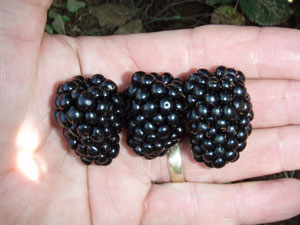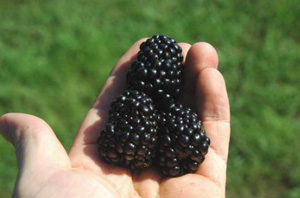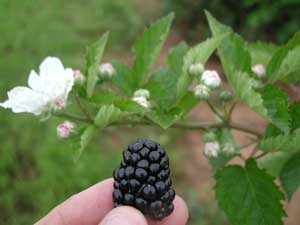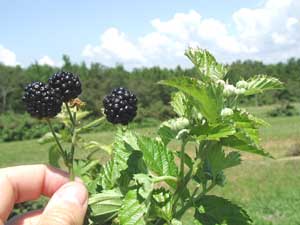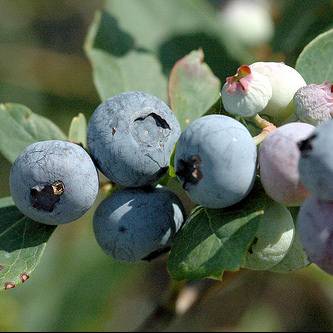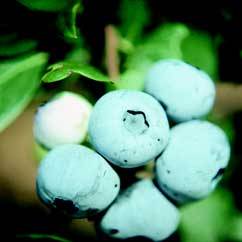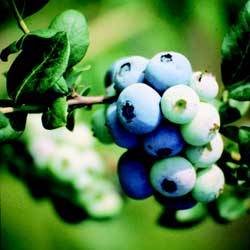Contact
Extension Agent - Agriculture
Phone: 501-268-5394
Fax: 501-279-6247
Email: ssanders@uada.edu
White County Extension
2400 Old Searcy Landing Rd
Searcy, AR 72143
Home Garden Berries in Arkansas
Small fruits can be grown in a selected garden area or used in landscape design to add an aesthetic touch while producing flavorful and nutritious fruit. Most small fruit crops require a minimum amount of space for planting compared to the quantity of fruit produced. Many small fruit crops will begin producing fruit one or two years after planting.
Home fruit growers should be aware of potential problems that can occur with small fruit crops. Fruit diseases, insect pests, birds, and weather extremes can cause losses and reduce fruit quality. Success with small fruit crops in the home garden will depend on the attention given to all phases of production including variety selection, soil management, fertilization, pruning, and pest control.
See our Arkansas Small Fruit Management Schedule for more information.
It is important to plant only what you can care for properly. A small, well-tended planting is better and will produce more fruit of higher quality than a large neglected planting.
The small fruit crops recommended for home fruit production in Arkansas are:
- blackberry
- blueberry
- grape
- muscadine
- raspberry
- strawberry
What is going on with my berries?
To find out visit the fruits, nuts, & vegetables insect management page
Blackberries are a native crop to Arkansas and many areas of the United States. Unlike many fruit crops, blackberries can be grown with little to no pesticide use in the home garden and require fewer inputs in commercial production.
- Wide adaptation to soil type is found with blackberries.
- The preferred soil pH is 5.5 to 6.5.
- Good drainage is required.
- Plants should not be grown in sites where water stands for long periods.
Thorns: To Be or Not To Be
The University of Arkansas has spent a great deal of time and effort with its fruit breeding program developing blackberry cultivars that have become the standard worldwide. All of the blackberry cultivars developed by the University of Arkansas have been named after Native American Indian tribes.
The University of Arkansas' cultivars, both thorny and thornless, have been shown to be adapted statewide. They are upright in growth habit and should be grown in a hedgerow-type system. They do not require the trellising system used for trailing and semi-erect varieties. These cultivars are floricane-fruiting, thus the canes must be overwintered for fruiting the second year.
The University of Arkansas patented blackberry cultivars are available from licensed blackberry propagators.
Recommended University of Arkansas Cultivars for Home Gardens
| Thorny | Thornless |
|---|---|
|
|
*expired patent; contracts for propagation no longer being maintained
What is a primocane-fruiting blackberry?
The primocane-fruiting blackberry fruits on current-season canes. This new type of blackberry could greatly change blackberry production. The first commercial primocane-fruiting blackberry cultivars were released by the University of Arkansas in 2004.
Learn How To...
In Arkansas, northern highbush blueberries are grown in the northern counties, and rabbiteyes are grown in more central and southern areas.
Southern highbush evaluations and limited commercial production have begun in the traditional rabbiteye areas of Arkansas, and two southern highbush cultivars have been introduced.
Soil
A fundamental need in blueberry production is an acid soil, with a pH of 4.8 to 5.4 preferable in Arkansas, and a soil that is of a light texture. Sandy loam is preferred but not an absolute requirement. A recommended practice is the addition of peat moss at a rate of one to two gallons per plant to the planting hole at planting, along with mulching with an organic material such as pine straw, sawdust or wood chips. A mixture of sawdust and wood chips is preferable.
Irrigation is a must for plant survival and productivity.
Blueberries usually fruit the third season after planting. Flower buds will develop on second-year plants, but it is best to remove these to encourage plant growth in the second season.
Pest Control
Pest control on blueberries is minimal, and routine fungicide and insecticide applications are not commonly needed. Bird control is the major issue, particularly on small plantings. Netting or scaring devices are two options to consider.
Which blueberry type or variety to plant is a fundamental issue. This is largely dictated by location, with northern highbush adapted to the upper South and northward, rabbiteyes from the mid-South and southward and southern highbush from the upper South and southward.
The University of Arkansas patented blueberry cultivar 'Norman A-272' is available from licensed blueberry propagators.
*expired patent; contracts for propagation no longer being maintained.
Learn How To...
| FSA6130 | Choose the Best Blueberry Cultivar to Plant Small Fruit Cultivar Recommendations for Arkansas |
| Where to Buy University of Arkansas Blueberry Cultivars Licensed Propagators - University of Arkansas Patented Blueberries |
|
| FSA6104 | Grow Blueberries in Arkansas Blueberry Production in the Home Garden |
| MP467 | Control Pests Arkansas Small Fruit Management Schedule |
| MP144 | Control Pests - Insecticides Insecticide Recommendations for Arkansas - Blueberries |
| MP154 | Control Disease Arkansas Plant Disease Control Products Guide | Small Fruit Diseases - Home Garden |
| MP44 | Control Weeds Recommended Chemicals for Weed and Brush Control for Arkansas | Fruits & Nuts |
| FCS506 | Enjoy the Harvest! Arkansas Fresh: Blueberries (color) |
In Arkansas, strawberries are favorites in home gardens. The bright red, flavorful fruit are picked from April thru June in our state. Strawberries can be produced as “annuals” – which means only one year of production – if special cultivars like 'Chandler' are planted in the fall on raised beds then picked one time the following spring, then start over. They can also be produced as “perennials” or “matted-row production” by planting cultivars like 'Cardinal' in the fall either on beds or in rows. These types will produce their first crop the following spring but will produce more abundantly the second spring and thereafter. These perennial plants can last at least 7 years if maintained, and will produce many baby plants each season to renew the field.
Learn How To...
| FSA6130 | Choose the Best Strawberry Cultivar to Plant Small Fruit Cultivar Recommendations for Arkansas |
| FSA6103 | Grow Strawberries in Arkansas Strawberry Production in the Home Garden |
| Grow with Plasticulture Plasticulture Production NCSU Cooperative Extension |
|
| MP467 | Control Pests Arkansas Small Fruit Management Schedule |
| MP144 | Control Pests - Insecticides Insecticide Recommendations for Arkansas | Strawberries |
| MP154 | Control Disease Arkansas Plant Disease Control Products Guide | Small Fruit Diseases - Home Garden |
| FSA7528 | Control Disease - Gray Mold Gray Mold - A Silent Strawberry Nemesis (color) |
| MP44 | Control Weeds Recommended Chemicals for Weed and Brush Control for Arkansas | Fruits & Nuts |
| FCS506 | Enjoy the Harvest! Arkansas Fresh: Strawberries (color) |
